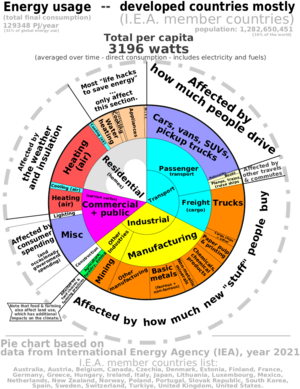Reduce energy demand: Difference between revisions
(Created page with "==Why== * The majority of the world's energy comes from fossil fuels, which cause climate change. * The less energy we need, the easier it is to decarbonize the energy supply (switch to renewables). ==How== <!-- TODO: when filling in the part about manufacturing less stuff, be sure to mention that many factories still use coal power --> ===Personal actions=== {{empty}} ===Collective actions=== {{empty}} ==FAQ== ====Is there any point in saving ''ele...") |
No edit summary |
||
| Line 1: | Line 1: | ||
[[File:energy-demand-pie1.png|thumb|'''Pie chart of energy consumption (fuels + electricity).'''<br /><br />Note that your lights & computers are only a tiny piece of the pie. Driving & manufacturing are far more significant.]] | |||
==Why== | ==Why== | ||
* The majority of the world's [[energy]] comes from [[fossil fuels]], which cause [[climate change]]. | * The majority of the world's [[energy]] comes from [[fossil fuels]], which cause [[climate change]]. | ||
| Line 11: | Line 12: | ||
==FAQ== | ==FAQ== | ||
====Is there any point in saving ''electricity'' if my local town/city is powered with all renewables anyway?==== | ===="Should I replace my computer screen with a new 'energy-saving' one?"==== | ||
No. It takes far more energy to ''manufacture'' new devices than the devices ever use. | |||
This is true in general for electronics and [[appliances]], but there may be some exceptions. See: [[To replace or not to replace]]. | |||
===="Is there any point in saving ''electricity'' in the winter if I have to use electric space heaters anyway?"==== | |||
No. [[Wasted electricity is the same as electric heating]]. | |||
<!-- | |||
===="Is there any point in saving ''electricity'' if my local town/city is powered with all renewables anyway?"==== | |||
Yes. Renewable energy sources still have a ''maximum output power capacity''. Anytime that capacity is exceeded, [[fossil fuel]] power plants are used to fill in the gap. On the flip side, whenever demand is ''below'' capacity, the [[surplus electricity]] could (in principle) be put to good use, such as for producing [[hydrogen gas]] that could later be burned in place of fossil fuels. In any case, we're going to need all the electricity we can get, so we shouldn't waste it. Also note that [[nuclear power]] is not unlimited either, because uranium is a finite resource. | Yes. Renewable energy sources still have a ''maximum output power capacity''. Anytime that capacity is exceeded, [[fossil fuel]] power plants are used to fill in the gap. On the flip side, whenever demand is ''below'' capacity, the [[surplus electricity]] could (in principle) be put to good use, such as for producing [[hydrogen gas]] that could later be burned in place of fossil fuels. In any case, we're going to need all the electricity we can get, so we shouldn't waste it. Also note that [[nuclear power]] is not unlimited either, because uranium is a finite resource. | ||
--> | |||
==See also== | |||
* [[Reduce the amount of land needed for agriculture]] | |||
Revision as of 16:12, 26 March 2024

Note that your lights & computers are only a tiny piece of the pie. Driving & manufacturing are far more significant.
Why
- The majority of the world's energy comes from fossil fuels, which cause climate change.
- The less energy we need, the easier it is to decarbonize the energy supply (switch to renewables).
How
Personal actions
This section has not been filled in yet.
Collective actions
This section has not been filled in yet.
FAQ
"Should I replace my computer screen with a new 'energy-saving' one?"
No. It takes far more energy to manufacture new devices than the devices ever use.
This is true in general for electronics and appliances, but there may be some exceptions. See: To replace or not to replace.
"Is there any point in saving electricity in the winter if I have to use electric space heaters anyway?"
No. Wasted electricity is the same as electric heating.